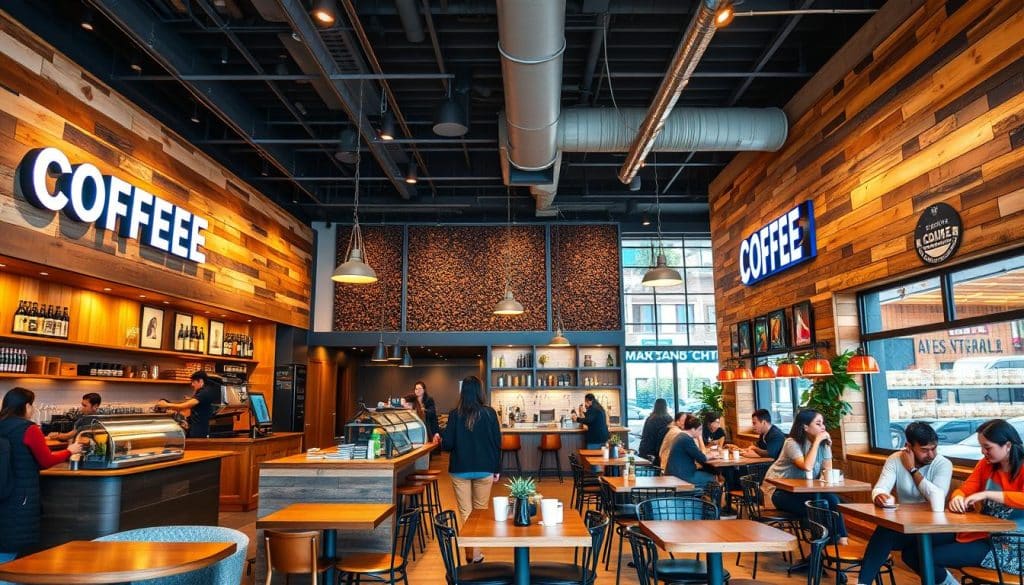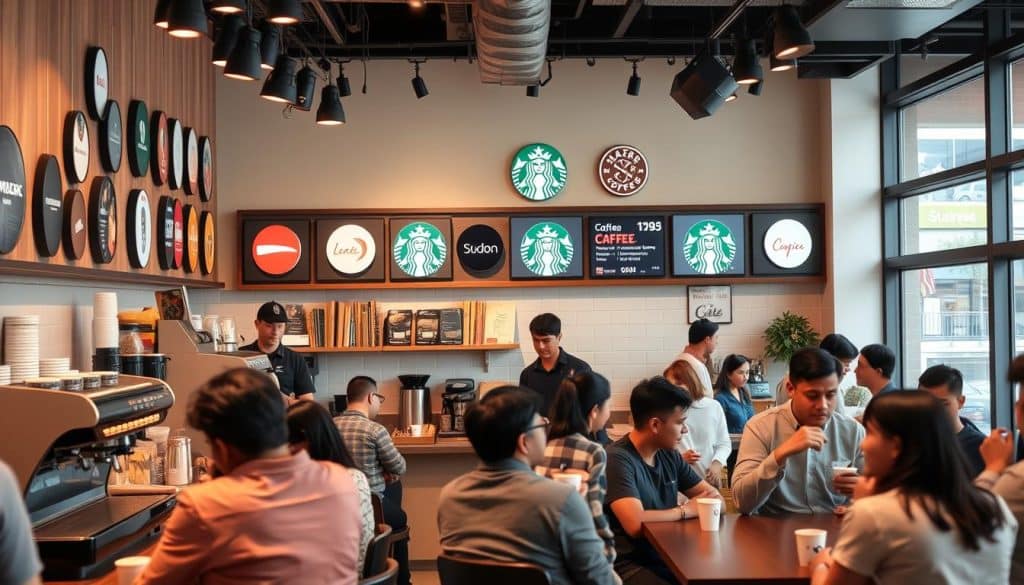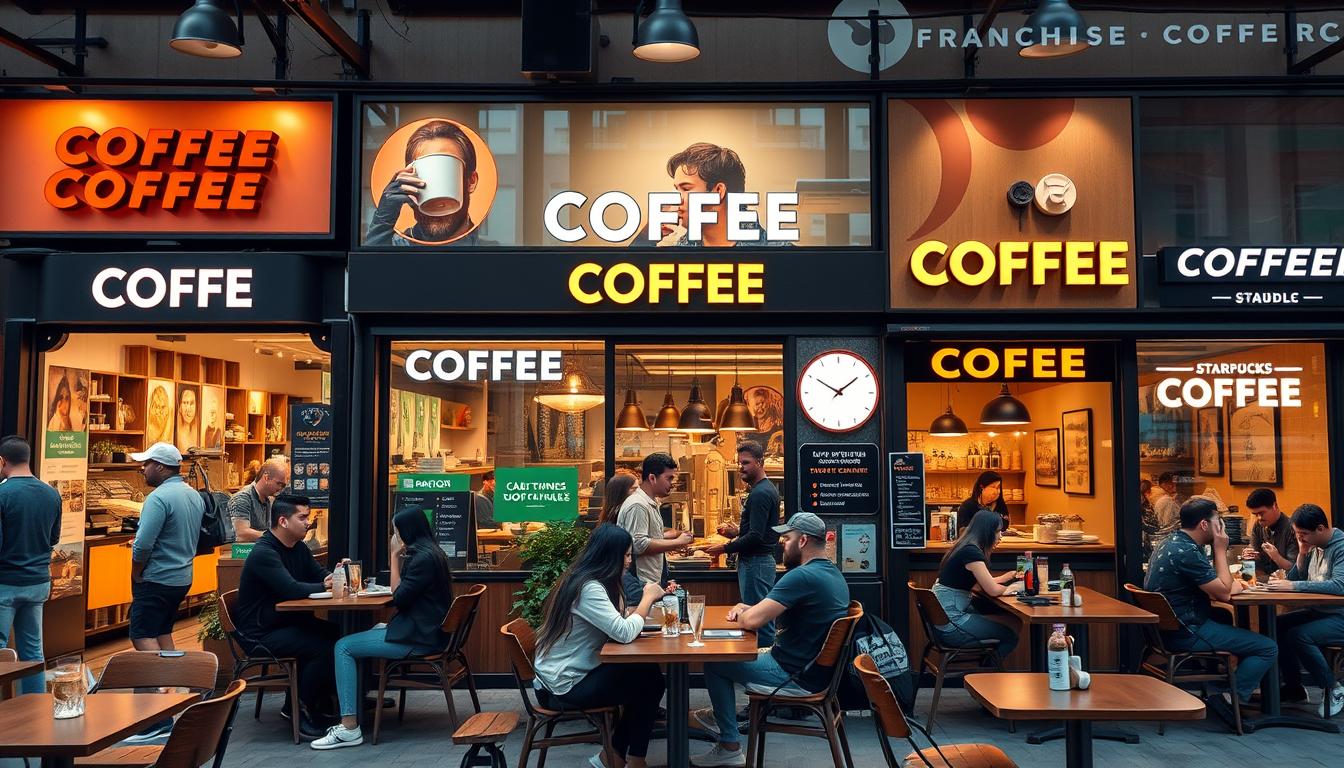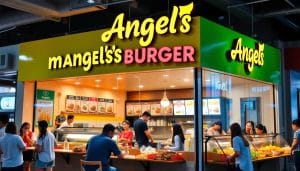Have you ever thought about why the coffee shop franchise industry is booming? It’s attracting both new and seasoned entrepreneurs. The industry is worth $11 billion and is expected to grow to $14 billion by 2025. This shows that people’s love for coffee is only getting stronger.
The market has many choices, from cozy cafes to trendy food trucks. Big names like Dunkin’ and Starbucks are doing well, showing the great opportunities out there. For those looking for affordable options, now is a great time to explore.
Franchises like Scooter’s Coffee have seen a huge 133.3% growth in three years. The Human Bean has also seen a 41.9% increase. This shows the exciting possibilities in this field. Talking to companies like Franocity can give you more information on costs and support for joining this profitable industry.
Key Takeaways
- The coffee franchising industry is valued at an impressive $11 billion.
- Expected growth in the coffee industry could reach $14 billion by 2025.
- A diverse range of franchise options is available, from food trucks to boutique models.
- Dunkin’ operates over 13,200 locations, showing its strong position.
- Contacting Franocity can provide more advice on franchise investments.
- Successful chains like Scooter’s Coffee and The Human Bean show there’s plenty of room for growth.
Understanding Coffee Shop Franchising
Coffee shop franchising is a way for people to start their own businesses. They get help from a well-known brand. This means they have access to good business strategies, marketing tools, and the brand’s reputation.
Definition of a Coffee Shop Franchise
A coffee shop franchise lets someone run a coffee shop with the help of a big brand. The person pays a fee to use the brand and its business methods. They also get training, support, and the brand’s name, which helps a lot.
Benefits of Franchising in the Coffee Industry
Franchising in coffee shops has many benefits. For example, it comes with a well-known brand that draws in customers right away. Unlike other franchises, Hard Bean Coffee doesn’t charge high fees or royalties.
This saves a lot of money for the person starting the business. Also, the franchisor provides systems and training, making it easier to start. This means the new business owner has a better chance of doing well.
Top Coffee Shop Chains to Consider
Looking into coffee shop franchises can be a great move for business owners. Many top brands in the coffee world are known for their strong business models and wide appeal. These brands use different strategies to win over customers and offer top-notch products.
Starbucks: A Leader in the Industry
Starbucks is a giant in coffee retail, with over 38,000 stores globally. It’s famous for its high-quality coffee and welcoming atmosphere. Starbucks focuses on quality and customer happiness, making it a top pick for those looking to join a well-known brand.
The company has strong marketing and training programs. These help new owners feel supported and reduce risks.
Dunkin’: A Strong Competitor
Dunkin’ Brands Group is the biggest coffee shop franchisor, opening 1,500 new stores in five years. It offers a wide range of coffee and food, appealing to many customers. Dunkin’ has strong marketing that helps franchisees draw in and keep customers, making it a favorite among coffee shop brands.
Peet’s Coffee: Quality and Community
Peet’s Coffee, started in Berkeley, California, has grown to over 200 locations. It’s known for its craft coffee and community focus. The brand values high-quality beans and rich flavors, attracting coffee lovers.
Franchisees get support from Peet’s commitment to quality and a loyal customer base. This helps them succeed in the competitive coffee market.
Factors to Evaluate Before Investing
Before diving into a coffee shop franchise, it’s key to look at several important factors. The cost to start a franchise is a big one. The price can change a lot based on the brand and where it’s located. For example, big chains might need $438,000 to $1,800,000, while smaller spots could cost between $100,000 to $700,000.
Initial Investment Costs
Investors need to do a deep dive into their finances. This includes not just the franchise fee but also things like rent and making the place look good. Looking closely at different franchises can help find one that fits your budget and goals.
Location and Market Demand
The spot you choose is super important for your coffee shop’s success. Where you are can really affect how much money you make. You should study the area to see if it’s good for your business.
Franchise Support and Training
It’s also important to know what kind of help the company offers. Good training and support can make a big difference. This helps you make smart choices and grow your business.
Popular Coffee Shop Franchise Models
The coffee shop franchise world offers many models. These cater to different tastes and investment plans. As the coffee market expands, new coffee shop franchise investment opportunities emerge. They mix great customer service with smart business practices.
Drive-Thru vs. Traditional Locations
Drive-thru coffee shops are getting more popular. Scooter’s Coffee, for example, has over 800 locations across the country. They focus on quick service, unlike traditional coffee shops that need more space.
Scooter’s Coffee kiosks are about 664 square feet. Their endcap models need 800 to 1,000 square feet. They choose locations with lots of car traffic, reaching more customers.
Mobile Coffee Shops and Trucks
Mobile coffee shops and trucks are also gaining traction. Brands like DonutNV offer fresh coffee and mini doughnuts. They can go to different places, making them convenient for customers.
These mobile options, along with good marketing, show the coffee market’s growth. Brands like Ziggi’s Coffee and Just Love Coffee Cafe also adapt. They offer everything from drive-thru to cozy coffeehouse settings. This variety shows the coffee world is always changing, with many coffee shop franchise investment opportunities for owners.

Financial Performance of Coffee Shop Franchises
Coffee shop franchises offer great chances for making money. In 2024, the U.S. coffee shop market was worth about $47 billion. There were around 37,000 coffee shops across the country. Some franchises make between $528,000 and $1,160,000 a year, showing their high earning possibilities.
Average Revenue Potentail
Just Love Coffee Cafe is a standout, making an average of $613,000 a year. Other coffee and tea shops make around $587,000. Starting a coffee shop costs between $328,000 and $1,131,000, depending on the size. Costs include lease improvements, equipment, and marketing, which impact profits.
Royalty Fees and Profit Margins
Knowing the costs is key to understanding profits. Just Love Coffee Cafe franchisees pay 6% in royalties and 2% for marketing. With a 15% EBITDA margin, profit margins can vary from 4.0% to 20.5%. Given that costs of goods sold are about 40% of sales, it’s important to have realistic profit goals.
Finding the Right Coffee Shop Franchise
Finding the right coffee franchise is key to success in the coffee market. With 73% of Americans drinking coffee every day, knowing the local competition and what customers want is vital. This research helps match the franchise with what people are looking for.
Research and Market Analysis
Doing deep research on coffee franchises is important. It lets you see how you stack up against others. By looking at nearby coffee shops and understanding who your customers are, you can make smart choices. The U.S. coffee market is big and growing, so good research can guide you.
Franchise Disclosure Document (FDD)
The Franchise Disclosure Document (FDD) is a must-read for anyone looking to buy a franchise. It has all the important details, like how much money you’ll need to start and what you’ll have to pay later. For example, Scooter’s Coffee wants you to have $500,000 in net worth. They also ask for a big investment, between $894,500 and $1,393,000. Reading the FDD carefully helps you know what you’re getting into.

The Importance of Brand Identity
In the competitive coffee industry, a strong brand identity is key to success. Good branding helps connect with customers, building loyalty and trust. This trust drives sales. Knowing what customers like is vital for making products and marketing that speak to them.
Recognizing Consumer Preferences
Customers value trust and awareness when choosing a brand. They prefer brands that offer quality coffee and create an emotional connection. The story and experience of a coffee shop shape how people see it.
For example, Amazing Coffee shows how emotional connection can keep customers coming back. Being consistent in branding helps stand out in a crowded market.
Developing a Unique Selling Proposition
A unique selling proposition (USP) sets a coffee shop apart. It’s important in a market full of choices. Many franchises face challenges in maintaining a consistent brand image.
Having clear brand guidelines helps keep a unified look. Technology and training are key to keeping branding consistent. Overcoming these hurdles boosts marketing and sales.
Marketing Strategies for Coffee Shops
In the world of coffee franchises, it’s key to have good marketing strategies. With over 38,000 coffee shops in the U.S., standing out is a must. Social media is a big help in reaching out to customers and building strong relationships.
By using Instagram and TikTok, coffee shops can show off their drinks and connect with the community.
Social Media Engagement
Social media lets coffee shops share their story and menu in a fun way. Posts with bright pictures of drinks or sneak peeks of how they’re made catch people’s eyes. A strong online presence, along with active engagement, can really bring in more customers.
Studies show that 84% of franchisors mix local and digital marketing. So, using social media well is a smart move for promotions.
Loyalty Programs and Promotions
Loyalty programs are a great way to keep customers coming back. By rewarding repeat visits, coffee shops build a community feeling. Promotions like special deals or discounts for subscribers can also boost sales and draw in new people.
Adding these tactics to your marketing plan helps build loyalty and visibility. This ensures your coffee shop stays successful in a crowded market.
Operational Challenges in Coffee Franchising
Running a coffee franchise comes with its own set of operational challenges coffee franchises face. Ensuring success and profit requires good staff training and management. These are key to providing top-notch customer service and keeping operations smooth.
Staff Training and Management
Good coffee shop management starts with thorough staff training. The restaurant industry sees high employee turnover, making it hard to keep skilled workers. Labor costs can be up to 45% of a coffee shop’s budget.
It’s important to manage staff levels well, both when it’s busy and when it’s not. This helps control costs and keep service quality high. Clear goals and performance metrics also help manage team performance and create a positive work atmosphere.
Inventory Control and Supply Chain
Managing inventory well is key to success. Coffee franchises need to balance what customers want with the logistics of supply chain management. Using technology, like Nory, can improve management by providing useful data for making better choices.
These tools can make operations more efficient and cut costs. Knowing the local market helps make smart inventory decisions. This ensures popular items are always stocked while reducing waste.
Success Stories of Notable Coffee Franchises
Looking at successful coffee shops shows us how to grow and keep customers happy. Starbucks is a great example of a brand that keeps improving and staying consistent. We can also learn a lot from owners of brands like PJ’s Coffee and Bad Ass Coffee of Hawaii.
Case Study: A Successful Starbucks Franchise
Starbucks’s success shows the power of quality and being open to change. Many of its stores listen to what customers say, making them more loyal. The brand also adds drive-thru services, meeting customer needs and making things run smoother.
These moves show how to stay innovative while keeping customers happy.
Lessons from Independent Franchise Owners
Owners like Lenny and Yvonne Sims and Maggie and Richard Sauter from PJ’s Coffee focus on community and family. Studies show people trust family businesses more than big companies. This trust helps PJ’s Coffee grow, with many family teams running their stores.
The Ballard brothers run 13 locations with a family-first approach. Bad Ass Coffee of Hawaii also values community, selling unique 100% Kona coffee. These stories teach us the importance of quality and community for success.
To follow their lead, try new things and listen to what locals want. For more ideas, check out successful coffee shop franchises.
Future Trends in Coffee Shop Franchising
The coffee shop franchise world is always changing. This is because of what people want and new ways to do things. The market, worth $95.5 billion in 2024, is growing by 3.51% each year. Brands need to focus on being green and using technology to stay ahead.
With 62% of Americans drinking coffee every day, shops are going green. They want to attract customers who care about the planet. This means using eco-friendly stuff and buying coffee beans in a way that’s good for the environment.
Sustainable Practices and Growth
Sustainability is key today. People want to buy from shops that care about the planet. This includes using stuff that breaks down easily and buying coffee beans that are fair trade.
A lot of coffee lovers choose shops based on how green they are. This is because they value quality and doing the right thing. Shops need to change how they do things to meet these new standards.
Technology Integration in Customer Experience
Technology is also changing how we interact with coffee shops. Mobile apps and contactless payments make things easier and more personal. More than two-thirds of orders are made through apps or delivery.
Adding these tech features is key for success. By being green and using technology, coffee shops can grow and keep customers happy. This is important in a market that’s always getting more competitive.
Check our Blog for other franchise opportunities.
FAQ
What are the best coffee shop franchise opportunities available today?
Top coffee franchises in the U.S. include Starbucks, Dunkin’, and Peet’s Coffee. They offer proven systems and strong market presence. This makes them great investments for those looking to start a franchise.
What is the cost to start a coffee shop franchise?
The cost to start a coffee franchise varies by brand. Dunkin’ franchises can cost between $438,000 and $1,800,000. The total cost depends on location, fees, and other investments.
What are the benefits of choosing a coffee shop franchise?
Coffee franchises offer brand recognition and established systems. They also provide support from the franchisor. This support can help you succeed in a competitive market.
How do I evaluate a coffee franchise investment opportunity?
To evaluate a franchise, look at the initial investment and market demand. Understand the support and training offered by the franchisor. Market research is key to making a good choice.
What types of franchise models are available in the coffee industry?
There are many coffee franchise models. You can choose from traditional stores, drive-thru locations, or mobile shops. Each model offers different opportunities and meets different customer needs.
What is the average revenue for coffee shop franchises?
Revenue varies by franchise. Brands like Peet’s Coffee have high annual sales. Knowing the financials of different franchises is important for investors.
What is a Franchise Disclosure Document (FDD)?
The Franchise Disclosure Document (FDD) gives insights into costs and obligations. It’s essential for understanding the franchise before investing. Review it carefully.
How can brand identity impact my coffee franchise?
A strong brand identity sets you apart from competitors. Knowing what customers want helps you create unique offerings. This leads to successful marketing and customer loyalty.
What marketing strategies are effective for coffee franchises?
Good marketing for coffee franchises includes social media, loyalty programs, and promotions. These strategies help attract and keep customers.
What operational challenges do coffee shop franchises typically face?
Common challenges include training staff, managing inventory, and supply chains. Overcoming these ensures happy customers and a successful franchise.
Can you share any success stories from coffee franchises?
Success stories, like those from Starbucks franchise owners, show the importance of being adaptable and customer-focused. These lessons help new franchisees succeed.
What future trends are shaping the coffee shop franchise industry?
Trends include a focus on sustainability and eco-friendly practices. Technology, like mobile ordering, is also becoming more important for improving the customer experience.





